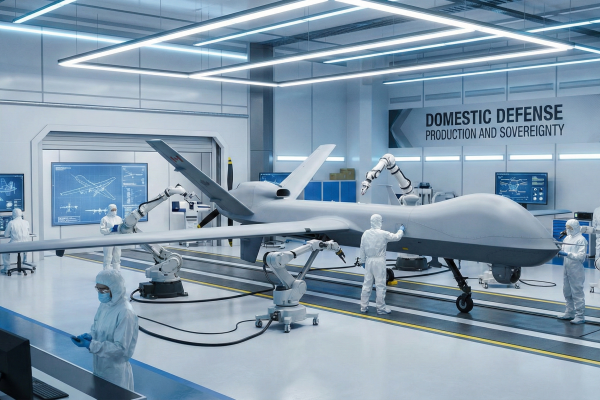May 22nd, 2025 | 07:10 CEST
Overlooked gems? Why artificial intelligence will catapult Novo Nordisk, NetraMark, and UnitedHealth to the forefront
The pharmaceutical industry is undergoing a historic transformation. Artificial intelligence is compressing drug development times from decades to months, reducing costs by billions, and unlocking therapies for previously untreatable diseases. Algorithms sift through genome data, simulate drug candidates, and optimize clinical trials with a precision that surpasses that of human researchers. This disruption is not only creating medical milestones but also lucrative opportunities for investors. Today, we look at three candidates and analyze the current situation at Novo Nordisk, NetraMark Holdings, and UnitedHealth.
time to read: 5 minutes
|
Author:
Armin Schulz
ISIN:
NOVO NORDISK A/S | DK0062498333 , NETRAMARK HOLDINGS INC | CA64119M1059 , UNITEDHEALTH GROUP DL-_01 | US91324P1021
Table of contents:

"[...] As a company dedicated to developing treatments for rare heart diseases, we see this as an opportune moment to contribute to the fight against heart disease and make meaningful strides in improving heart health worldwide. [...]" David Elsley, CEO, Cardiol Therapeutics Inc.
Author
Armin Schulz
Born in Mönchengladbach, he studied business administration in the Netherlands. In the course of his studies he came into contact with the stock exchange for the first time. He has more than 25 years of experience in stock market business.
Tag cloud
Shares cloud
Novo Nordisk – How will the change in leadership affect the Company?
Novo Nordisk is using artificial intelligence to disrupt the pharmaceutical industry. In drug discovery, algorithms analyze billions of molecules to identify candidates for diabetes and obesity therapies – in some cases 80% faster than traditional methods. Collaborations with Microsoft and MIT enable the use of quantum computing for complex protein structures. In production, AI models optimize error detection, while language systems such as Claude 3.5 automatically generate regulatory documents. These leaps in efficiency shorten development cycles and reduce the burden on operations.
The surprising resignation of CEO Lars Fruergaard Jørgensen by mutual agreement with the supervisory board raises questions. Jørgensen, the architect of GLP-1's success, leaves behind a growing company, but stalled pipeline projects and communication mishaps regarding study data have recently weighed on confidence. The appointment of CFO Jonas Guldbæk Pedersen as an interim solution signals stability. However, the question of whether the growth strategy will remain unchanged or whether a change of course will be made must be answered. The Company emphasizes that it will continue its AI offensive and expansion into cardiology markets. At the same time, Eli Lilly is pushing ahead with oral GLP-1 therapies – a race that must now be mastered under new leadership.
Beyond personnel changes, Novo is focusing on substantial investments. The acquisition of production facilities worth USD 11 billion is intended to stabilize supply chains, while 44 pipeline projects, including cardiovascular innovations, will diversify the portfolio. The Company remains in a strong financial position. Gross margins of over 80%, a return on capital of 46%, and rising cash flows underscore its profitability. Analysts see the current valuation level as an opportunity despite leadership risks. The share price is currently moving sideways. A share currently costs EUR 59.78.
NetraMark Holdings – AI revolutionizes clinical trials
NetraMark is taking the integration of artificial intelligence into drug research to a new level. The Company uses algorithms it has developed in-house to make clinical trials more efficient – from patient recruitment to data analysis. At its core is the NetraAI platform, which recognizes patterns even in small data sets and thus makes precise predictions about the success of therapies. With modules such as NetraGPT, the system analyzes historical studies and medical literature to identify risks at an early stage. This approach not only reduces the duration of studies by up to 30% but also significantly increases the success rate in late-stage trials.
NetraMark is expanding its market position through collaborations with key players. The alliance with Worldwide Clinical Trials (WCT) enables the global distribution of NetraAI technology, initially in Phase 2 studies for neurological and oncological therapies. At the same time, pharmaceutical companies benefit from AI-supported tools for patient selection, which reduce dropout rates and save costs. Further partnerships, such as with the National Institute of Mental Health, highlight the scientific relevance of the platform. The Company is aiming for positive EBITDA by the end of the year. This goal appears realistic given the scalability of the solutions.
NetraMark director P.J. Haley recently caused a stir when he acquired 609,000 shares last week at prices ranging from CAD 1.37 to CAD 1.60. The purchase underscores management's confidence in its own technology and long-term strategy. It remains relevant for investors that NetraMark serves a niche market where AI-based study optimization could become a decisive competitive advantage - especially given that the industry invests billions annually in inefficient processes. The stock is currently trading at CAD 1.35, which is below the price Mr. Haley paid.
Interview by Lyndsay Malchuk with George Achilleos, CEO of NetraMark

UnitedHealth – AI as a driver of innovation
The UnitedHealth Group is establishing itself as a pioneer of the digital healthcare revolution. With over 1,000 AI applications, the group is optimizing processes from insurance processing to patient care. Algorithms speed up performance reviews, identify irregularities, and automate millions of customer inquiries. In everyday clinical practice, speech recognition tools relieve medical staff of documentation tasks, while predictive models detect risks such as sepsis at an early stage. Partnerships with tech giants such as Microsoft and Google Health are also driving forward the precision of diagnostic procedures. If AI can be used to manage service processes, it would be a key to cost control and quality improvement.
Despite its technological strengths, UnitedHealth faces complex hurdles. A cyberattack that compromised the data of 190 million users cost billions, while criminal investigations by the US Department of Justice are looking into allegations of incorrect health insurance billing. In addition, the medical cost ratio of 87.6% is weighing on margins, as medical expenses are growing faster than premium income. A recent accusation claims that the Company paid nursing homes to prevent elderly patients from being admitted to hospitals. The abrupt change in top management, including the return of experienced former CEO Stephen Hemsley, highlights the operational urgency of the matter.
Beyond short-term turbulence, UnitedHealth offers robust growth prospects. The aging US population is driving demand for health insurance, which already accounts for 40% of revenues. By 2050, the number of people over 65 will increase by 41%, ensuring steady customer growth without high acquisition costs. At the same time, the Company is benefiting from higher interest rates, which are increasing investment income from insurance reserves. With Hemsley at the helm, who holds USD 350 million worth of his own shares, UnitedHealth is focusing on operational discipline. Technological leadership, demographic tailwinds, and regulatory market dominance could form the basis for a sustained recovery. The stock is currently trading at USD 307.40.
Artificial intelligence is set to be a game changer for three currently undervalued companies. Novo Nordisk is accelerating drug development with AI and quantum computing, but must defend its pipeline against Lilly's GLP-1 competition. NetraMark is revolutionizing clinical trials with NetraAI. The latest insider buying signal of 609,000 shares underscores management's confidence in the technology. UnitedHealth uses over 1,000 AI tools to control costs in healthcare, but is struggling with cyber risks and operational issues. While Novo and UnitedHealth consolidate their market power, NetraMark could redefine clinical research as a niche leader. One thing is clear: algorithms will help shape the future of medicine.
Conflict of interest
Pursuant to §85 of the German Securities Trading Act (WpHG), we point out that Apaton Finance GmbH as well as partners, authors or employees of Apaton Finance GmbH (hereinafter referred to as "Relevant Persons") may hold shares or other financial instruments of the aforementioned companies in the future or may bet on rising or falling prices and thus a conflict of interest may arise in the future. The Relevant Persons reserve the right to buy or sell shares or other financial instruments of the Company at any time (hereinafter each a "Transaction"). Transactions may, under certain circumstances, influence the respective price of the shares or other financial instruments of the Company.
In addition, Apaton Finance GmbH is active in the context of the preparation and publication of the reporting in paid contractual relationships.
For this reason, there is a concrete conflict of interest.
The above information on existing conflicts of interest applies to all types and forms of publication used by Apaton Finance GmbH for publications on companies.
Risk notice
Apaton Finance GmbH offers editors, agencies and companies the opportunity to publish commentaries, interviews, summaries, news and the like on news.financial. These contents are exclusively for the information of the readers and do not represent any call to action or recommendations, neither explicitly nor implicitly they are to be understood as an assurance of possible price developments. The contents do not replace individual expert investment advice and do not constitute an offer to sell the discussed share(s) or other financial instruments, nor an invitation to buy or sell such.
The content is expressly not a financial analysis, but a journalistic or advertising text. Readers or users who make investment decisions or carry out transactions on the basis of the information provided here do so entirely at their own risk. No contractual relationship is established between Apaton Finance GmbH and its readers or the users of its offers, as our information only refers to the company and not to the investment decision of the reader or user.
The acquisition of financial instruments involves high risks, which can lead to the total loss of the invested capital. The information published by Apaton Finance GmbH and its authors is based on careful research. Nevertheless, no liability is assumed for financial losses or a content-related guarantee for the topicality, correctness, appropriateness and completeness of the content provided here. Please also note our Terms of use.




